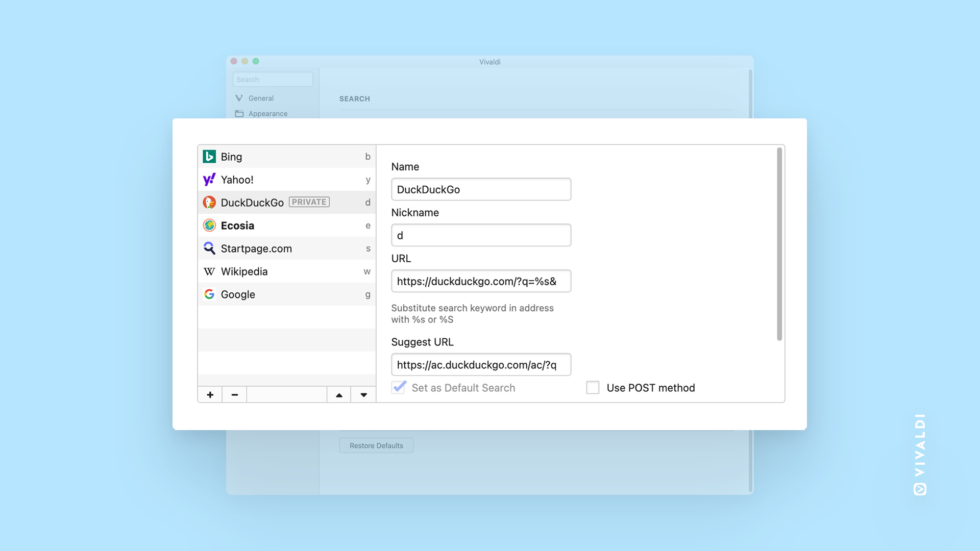
Read this article in 日本語.
As the demand for privacy-friendly search engines has grown, so have the options available.
When it comes to choosing a search engine, there are few things to look out for. The most obvious is whether the search engine tracks and collects data. After all, your search history can reveal a lot of privacy information about you. So choosing a search engine that doesn’t track you or collect any of your data is key. Alternatively, some search engines will anonymize your searches shortly after they are completed – it is all down to your comfort level.
Another issue is what happens after the data is collected.
As you are tracked, your data is fed to algorithms, creating a profile that can be sold to advertisers. But it doesn’t stop there. Over time you will start to see biased search results. This is because tracking search-engine companies want to show you what they think you are most likely to click on, rather than an objective set of results. Eventually, you may wind up in a bubble, with the search engine showing you only things they think you will agree with. Not only does this prevent you from becoming a less informed person, it can have other, broader implications – such as attempts to gain political influence. This is why we believe search-result neutrality is so important.
The third is to be aware that some search engines will set out to mislead you on their privacy focus – or lack thereof. With “privacy-friendly” becoming more and more of a selling point, keep an eye out for search engines that promise more protection than they deliver. And, if privacy is essential for you, be sure to compare the search engine’s privacy policy to its sales pitch – to check their claims against the reality.
Below, we’ve compiled a round-up of search engines – and their privacy policies – to help you find the one that’s right for you.
Want a better way to search? Here are six promising alternatives.
The first three are search engines available by default in Vivaldi – though of course you can customize Search to add your favorite search engine at any time.
DuckDuckGo – fully focused on privacy
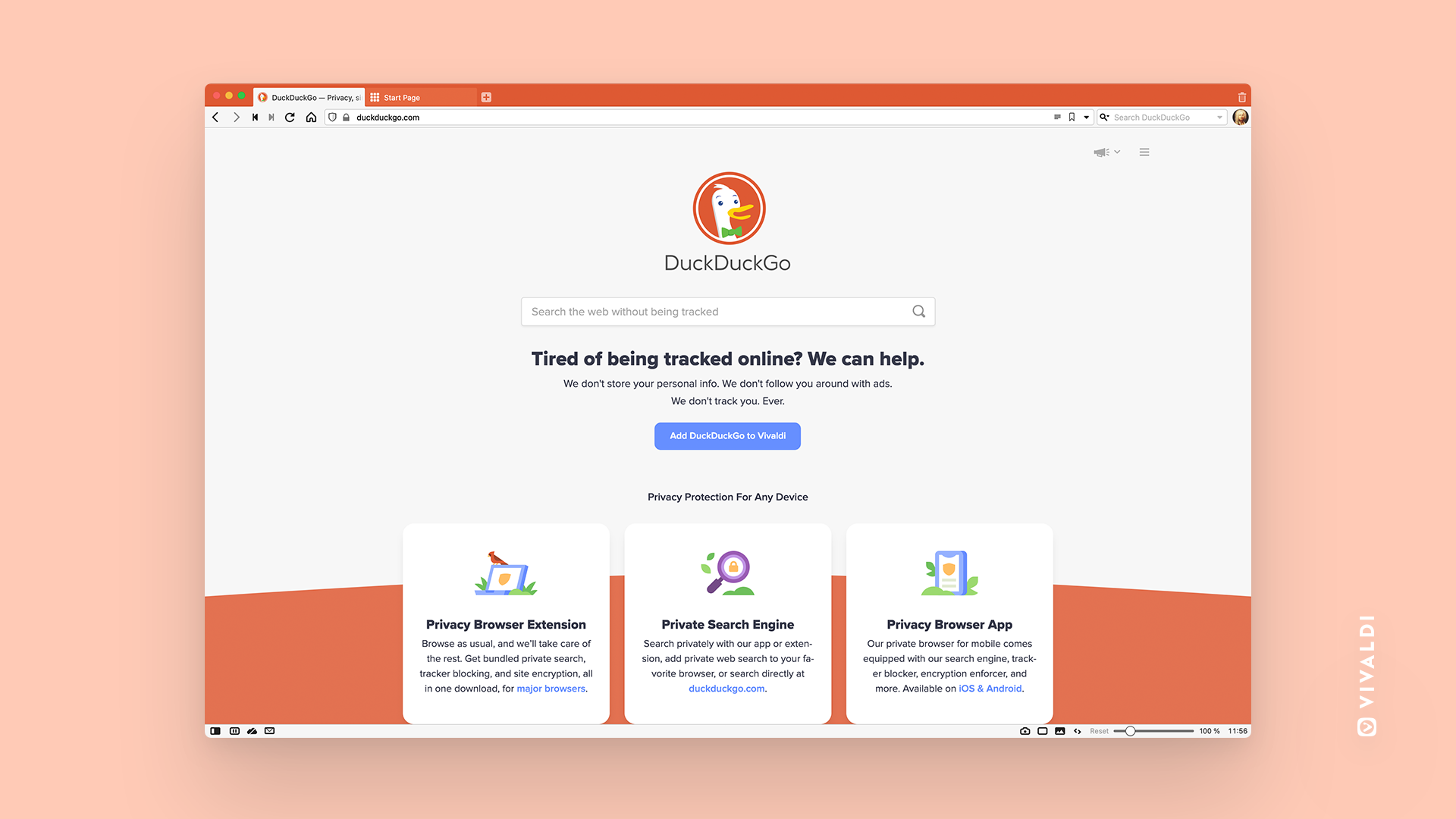
DuckDuckGo, likely the best known of this bunch, doesn’t track or store any personal information on its users. It also doesn’t follow you around with ads.
Because DuckDuckGo doesn’t collect your data, it doesn’t base the results it returns on what it thinks you want to see. If two people use DuckDuckGo to search the same term, they will get the same non-biased results.
In 2018, Vivaldi became the first browser to enable a default Private Search and to allow users to set a default search engine – DuckDuckGo – exclusively for Private Window browsing. When you search using our Private Window – with its glorious blurple default theme – your search history is not tracked, and for any websites you visit, cookies and temporary files will not be stored by Vivaldi.
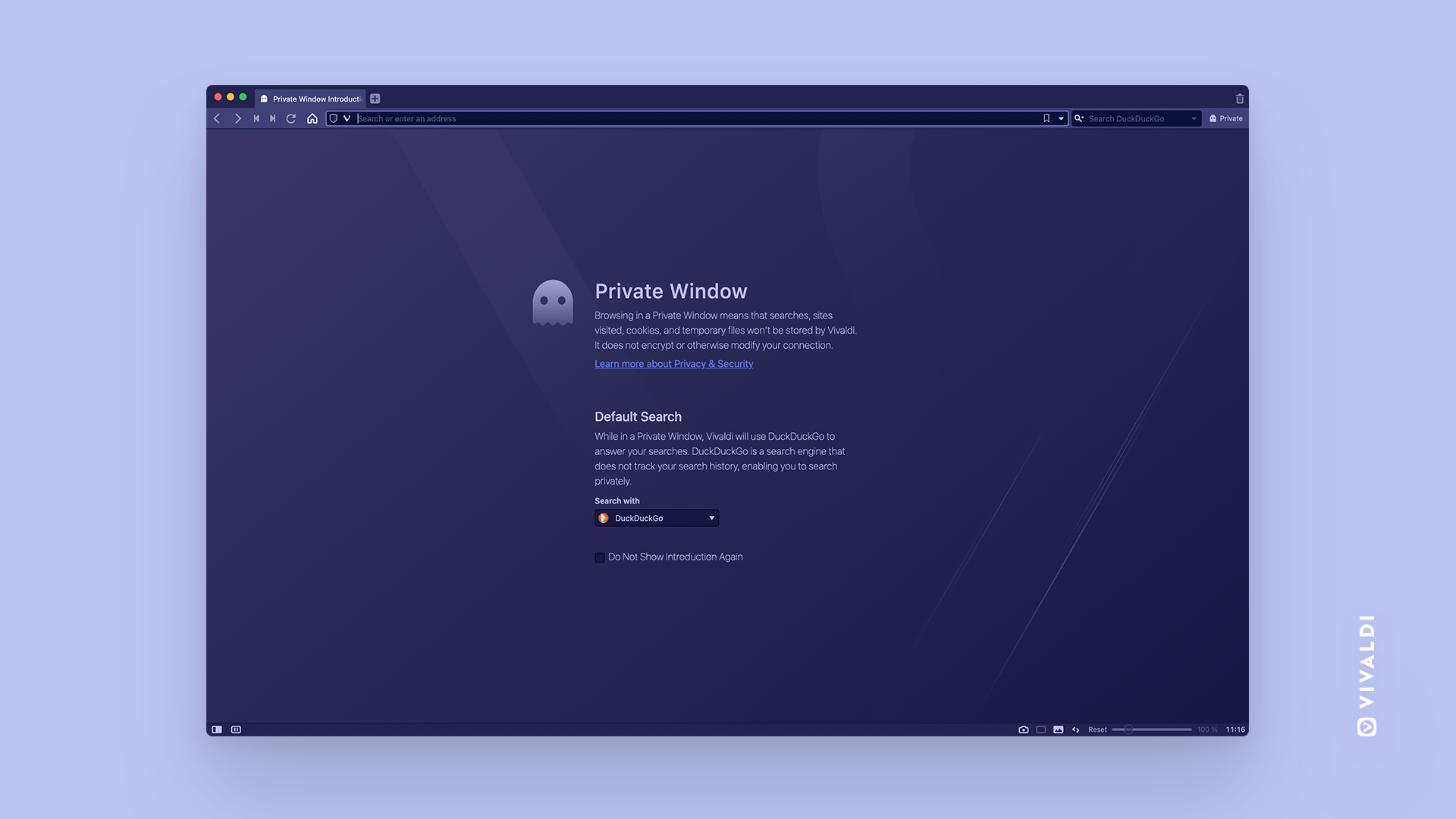
In addition to searching via its site or directly through Vivaldi, you can download the app by going here.
For the full story on DuckDuckGo’s privacy policy, go here.
Ecosia – for privacy- and eco-conscious users
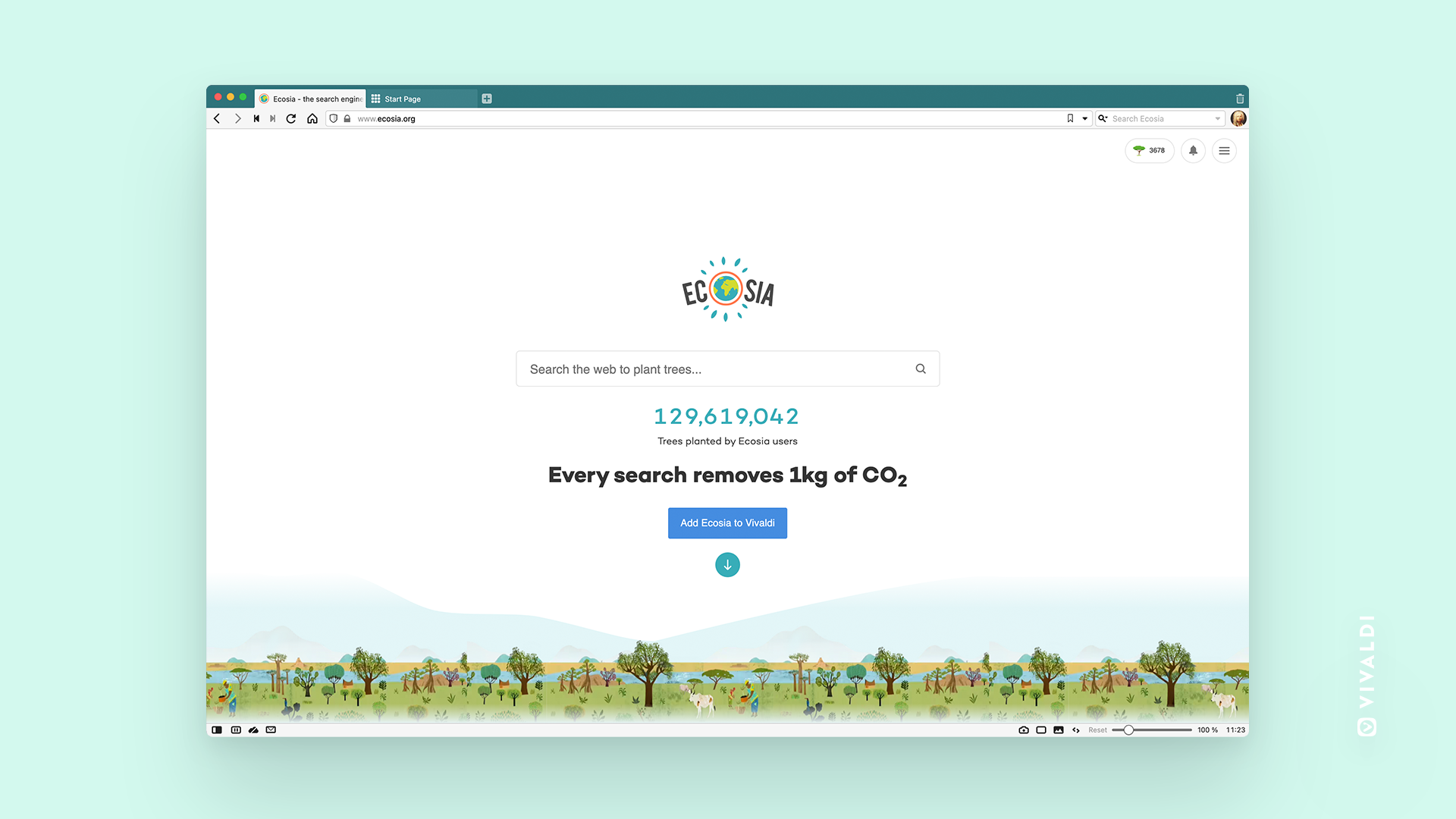
Ecosia is the search engine that protects forests along with your privacy. Ecosia doesn’t create personal profiles based on search history, and all searches get anonymized within one week. They don’t sell user data or searches to advertising companies and don’t use third-party trackers such as Google Analytics.
On top of that, Ecosia donates 80% of its profits from search ad revenue to support tree planting programs in the world’s most environmentally threatened areas. To date, Ecosia has planted over 129 million trees, with the count rising every second.
You can use Ecosia for search Ecosia via its site or directly through Vivaldi.
Ecosia’s privacy policy is available here.
StartPage – anonymize your onine behavior
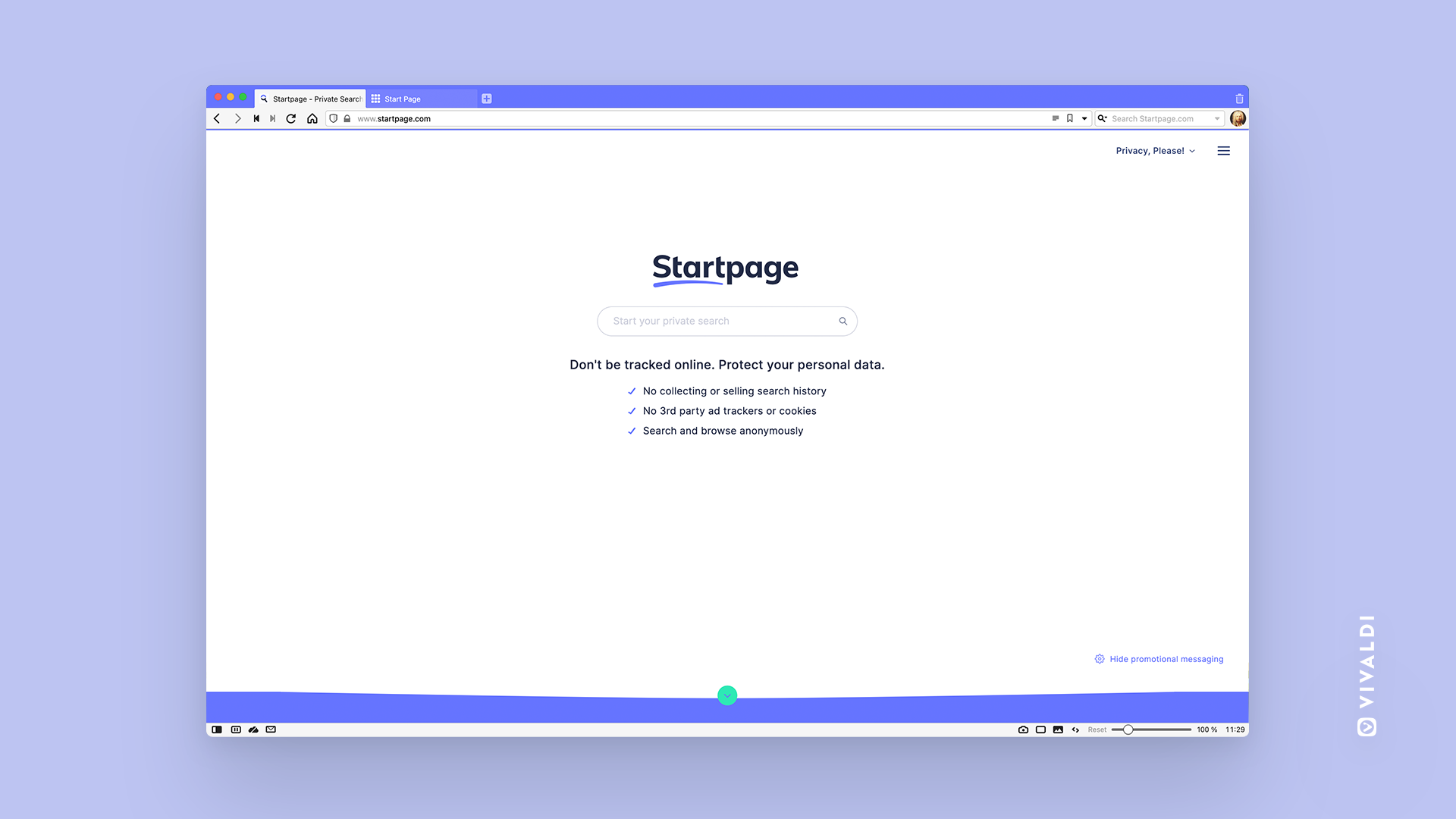
StartPage promises a safer way to search and browse online without personal data collection, tracking or targeting.
It focuses on user privacy in a slightly different way. StartPage utilizes Google’s search engine but anonymizes tracking of your online behavior. This means that you get your search results, without the search engine sending any personal information to Google’s servers.
StartPage also doesn’t filter results based on your past searches and online behavior, so you’re bound to get neutral search results.
Read all about StartPage’s privacy policy here.
The next three alternatives also protect your privacy, while providing you with unbiased search results.
Mojeek – putting people first
Mojeek was the first search engine to have a strict no tracking policy. Built from the ground-up with your privacy in mind, the company focuses its time on one thing and one thing only – “No tracking. Just Search.”
When you search on Mojeek, your results are based entirely on the keywords you enter. It does not collect any identifying information on you, such as IP addresses, search history or click behavior.
Mojeek also has its own searchable index of web pages, and therefore its very own ranking algorithm. This is unlike search engines that retrieve their results from other engines and ultimately rely upon that provider’s ranking.
For more details, check out Mojeek’s privacy policy here.
Qwant – because privacy is essential for freedom
Qwant considers privacy is a universal right. When using Qwant, you can be certain that your browsing history isn’t stored, you aren’t being profiled, and you won’t be targeted through personalized ads. With every new web search, you start fresh. This also means you get unfiltered, unbiased results.
Developed in France, all its servers are located in Europe and thus subject to European privacy legislation. But it has a global focus, citing Article 12 of the 1948 Universal Declaration of Human Rights as a driving force to protect all internet users, worldwide:
“No one shall be subjected to arbitrary interference with his privacy, family, home or correspondence, nor to attacks upon his honour and reputation. Everyone has the right to the protection of the law against such interference or attacks.”
Qwant sees its users as actively contributing to a privacy-friendly model for products and services, supporting a responsible and sustainable digital environment for future generations.
In addition to searching via its site, you can download its Android or iOS apps.
You can read the privacy policy here.
Peekier – preview websites before clicking through
Peekier allows you to peek through search results – fast and securely on a search engine that respects your privacy. No storing of cookies, IP addresses, search keywords or any other information. Your personal information remains yours, not shared with others.
Peekier makes full use of your screen’s real estate to display website previews of your search results. Clicking on a result maximizes the preview, allowing you to scroll through the website. If you’re interested, you can click through to the site. This can be a particular help on mobiles, as the quick loading previews can save you time and money from clicking through to a site that might not have the information you need.

And since Peekier loads the websites on its servers, sending your browser a rendered image, it deals with malware and other threats – providing you a safe, secure and private experience while on its website. You can still choose to visit any of the websites that interest you.
For more information on its privacy policy click here.
Over to you now. Which search engines do you use? Are you concerned about privacy online or getting trapped in a bubble? Let us know in the comments! 😀👇


